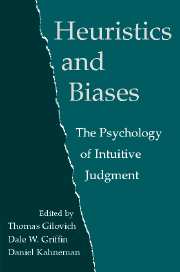Book contents
- Frontmatter
- Contents
- List of Contributors
- Preface
- Introduction – Heuristics and Biases: Then and Now
- PART ONE THEORETICAL AND EMPIRICAL EXTENSIONS
- 1 Extensional versus Intuitive Reasoning
- 2 Representativeness Revisited: Attribute Substitution in Intuitive Judgment
- 3 How Alike Is It? versus How Likely Is It?: A Disjunction Fallacy in Probability Judgments
- 4 Imagining Can Heighten or Lower the Perceived Likelihood of Contracting a Disease: The Mediating Effect of Ease of Imagery
- 5 The Availability Heuristic Revisited: Ease of Recall and Content of Recall as Distinct Sources of Information
- 6 Incorporating the Irrelevant: Anchors in Judgments of Belief and Value
- 7 Putting Adjustment Back in the Anchoring and Adjustment Heuristic
- 8 Self-Anchoring in Conversation: Why Language Users Do Not Do What They “Should”
- 9 Inferential Correction
- 10 Mental Contamination and the Debiasing Problem
- 11 Sympathetic Magical Thinking: The Contagion and Similarity “Heuristics”
- 12 Compatibility Effects in Judgment and Choice
- 13 The Weighing of Evidence and the Determinants of Confidence
- 14 Inside the Planning Fallacy: The Causes and Consequences of Optimistic Time Predictions
- 15 Probability Judgment across Cultures
- 16 Durability Bias in Affective Forecasting
- 17 Resistance of Personal Risk Perceptions to Debiasing Interventions
- 18 Ambiguity and Self-Evaluation: The Role of Idiosyncratic Trait Definitions in Self-Serving Assessments of Ability
- 19 When Predictions Fail: The Dilemma of Unrealistic Optimism
- 20 Norm Theory: Comparing Reality to Its Alternatives
- 21 Counterfactual Thought, Regret, and Superstition: How to Avoid Kicking Yourself
- PART TWO NEW THEORETICAL DIRECTIONS
- PART THREE REAL-WORLD APPLICATIONS
- References
- Index
19 - When Predictions Fail: The Dilemma of Unrealistic Optimism
from PART ONE - THEORETICAL AND EMPIRICAL EXTENSIONS
Published online by Cambridge University Press: 05 June 2012
- Frontmatter
- Contents
- List of Contributors
- Preface
- Introduction – Heuristics and Biases: Then and Now
- PART ONE THEORETICAL AND EMPIRICAL EXTENSIONS
- 1 Extensional versus Intuitive Reasoning
- 2 Representativeness Revisited: Attribute Substitution in Intuitive Judgment
- 3 How Alike Is It? versus How Likely Is It?: A Disjunction Fallacy in Probability Judgments
- 4 Imagining Can Heighten or Lower the Perceived Likelihood of Contracting a Disease: The Mediating Effect of Ease of Imagery
- 5 The Availability Heuristic Revisited: Ease of Recall and Content of Recall as Distinct Sources of Information
- 6 Incorporating the Irrelevant: Anchors in Judgments of Belief and Value
- 7 Putting Adjustment Back in the Anchoring and Adjustment Heuristic
- 8 Self-Anchoring in Conversation: Why Language Users Do Not Do What They “Should”
- 9 Inferential Correction
- 10 Mental Contamination and the Debiasing Problem
- 11 Sympathetic Magical Thinking: The Contagion and Similarity “Heuristics”
- 12 Compatibility Effects in Judgment and Choice
- 13 The Weighing of Evidence and the Determinants of Confidence
- 14 Inside the Planning Fallacy: The Causes and Consequences of Optimistic Time Predictions
- 15 Probability Judgment across Cultures
- 16 Durability Bias in Affective Forecasting
- 17 Resistance of Personal Risk Perceptions to Debiasing Interventions
- 18 Ambiguity and Self-Evaluation: The Role of Idiosyncratic Trait Definitions in Self-Serving Assessments of Ability
- 19 When Predictions Fail: The Dilemma of Unrealistic Optimism
- 20 Norm Theory: Comparing Reality to Its Alternatives
- 21 Counterfactual Thought, Regret, and Superstition: How to Avoid Kicking Yourself
- PART TWO NEW THEORETICAL DIRECTIONS
- PART THREE REAL-WORLD APPLICATIONS
- References
- Index
Summary
One of the most robust findings in the psychology of prediction is that people's predictions tend to be optimistically biased. By a number of metrics and across a variety of domains, people have been found to assign higher probabilities to their attainment of desirable outcomes than either objective criteria or logical analysis warrants. Yet the very prevalence of optimistic biases presents an intriguing dilemma: Given that many of the decisions people make, most of their choices, and virtually all plans are based on expectations about the future, it would seem imperative that people's predictions and expectations be free from bias. If the majority of predictions, expectations and performance-relevant perceptions are optimistically biased, how can people make appropriate decisions, or choose effective courses of action?
We review research on optimistic biases in personal predictions and address the question of how people can maintain these biases when doing so would seem to be maladaptive. We begin by reviewing empirical evidence that has shown optimistic biases to be a common feature of people's predictions and expectations.
EVIDENCE OF OPTIMISTIC BIAS IN PERSONAL PREDICTIONS
Henrik Ibsen maintained “that man is in the right who is most clearly in league with the future” (in Sprinchorn, 1964). By similar logic, one might argue that the clearest demonstrations of optimistic biases are those that have revealed systematic discrepancies between people's predictions and the outcomes they ultimately attain.
Information
- Type
- Chapter
- Information
- Heuristics and BiasesThe Psychology of Intuitive Judgment, pp. 334 - 347Publisher: Cambridge University PressPrint publication year: 2002
Accessibility standard: Unknown
Why this information is here
This section outlines the accessibility features of this content - including support for screen readers, full keyboard navigation and high-contrast display options. This may not be relevant for you.Accessibility Information
- 94
- Cited by
